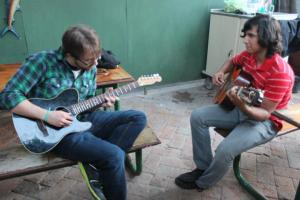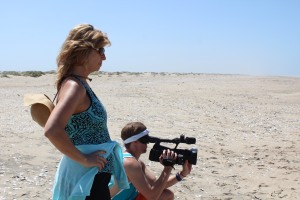 Four months ago, a dozen Pace University students and two professors embarked on a journey, aiming to understand the forces imperiling sea turtles on the Pacific coast of Mexico’s Baja peninsula and make a film about efforts to mesh turtle conservation with the need to sustain the economies and culture in the region’s fishing villages.
Four months ago, a dozen Pace University students and two professors embarked on a journey, aiming to understand the forces imperiling sea turtles on the Pacific coast of Mexico’s Baja peninsula and make a film about efforts to mesh turtle conservation with the need to sustain the economies and culture in the region’s fishing villages.
This was the third year in which the Pace course “Producing the Documentary” focused on efforts to balance human affairs with the environment. The last two films were on shrimp farming and cork forests and both were featured on Dot Earth, the blog of one of our professors.
The film, ¡Viva La Tortuga! Meshing Conservation and Culture in Magdalena Bay, is done:
We learned an enormous amount about sea turtles and Mexican fishing culture and about the challenges and opportunities that abound when making a film in farflung places:
Lou Guarneri: “I think the highest point in this course for me was the collaboration in the editing room. It really proved to me that no matter what happens, teamwork will always help create an amazing product. I also loved meeting and playing guitar with a Mexican local. It was an amazing experience for me. It’s pretty crazy to see music transcend language barriers.” 
Danielle Bard: “Being a vegetarian and environmentalist, seeing the turtles being monitored on the boats was an incredible experience. And then to be introduced to a beach of animal carcasses, it truly showed how much there is to do to help the environment and animals, turtles in particular. It really motivated me to help spread awareness about the turtles in Magdalena Bay.”
Matthew Maiorano: “My favorite and most interesting part of the trip was when we met Victor at ‘death beach.’ A vast array of dead marine life on a beach was something I never imagined I’d see up close. Seeing all of the turtle shells really hit home for me and opened up my eyes to how real of a problem this truly is.”
Prof. Maria Luskay: “My favorite memory was camping for the first time ever — on a beautiful beach in Magdalena Bay — and realizing that it was not the wind I was hearing on the tent throughout the night, but coyotes scratching on it as they were walking by. All in all, camping is not that bad.”
While we were filming in Magdalena Bay, one of the workers for RED Sustainable Travel told us that the best way we can help is by spreading awareness. By watching this documentary and spreading the word to others, you will be doing your part to help conserve these incredible animals and beautiful area. Knowledge truly is power.
“In the end, we conserve only what we love. We will love only what we understand. We will understand only what we are taught.” – Baba Dioum










